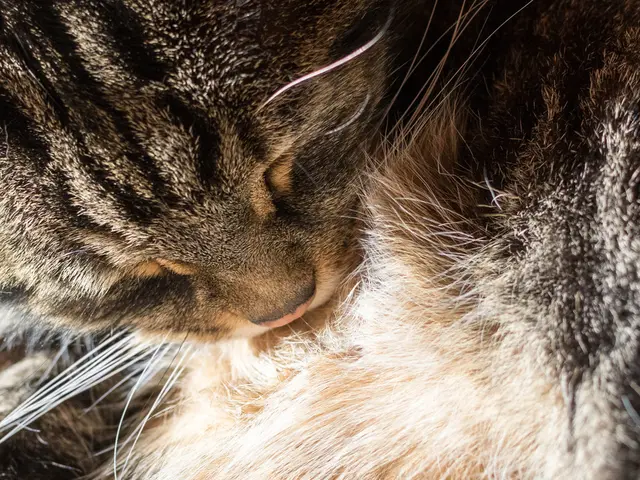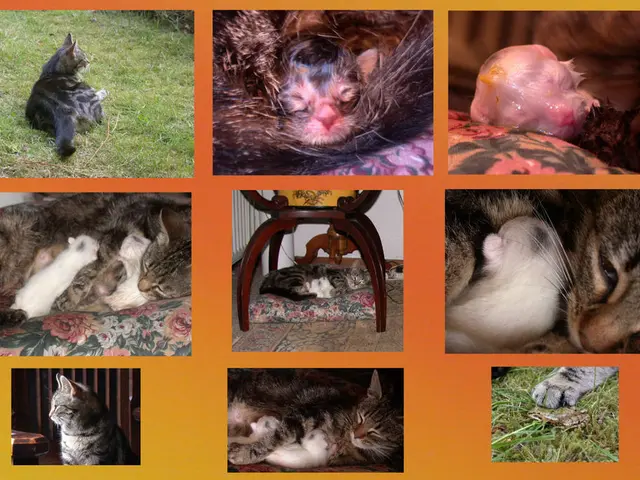Is it Possible for Cats to Contract Kennel Cough?
Can Cats Contract Kennel Cough? An In-depth Look at Bordetella in Cats
Kennel cough, medically known as Canine Infectious Respiratory Disease Complex (CIRDC), is a prevalent respiratory illness in dogs, caused by a combination of viruses and bacteria. However, the question of whether cats can also get kennel cough arises when a dog is diagnosed with the condition.
While dogs primarily contract kennel cough through various viruses, including the canine distemper virus, canine parainfluenza virus, and canine adenovirus type 2, the culprit bacterium, Bordetella bronchiseptica or Bordetella, can potentially infect cats.
It is vital to distinguish that cats don't develop kennel cough, as the viruses are species-specific. Nevertheless, they can experience respiratory symptoms due to Bordetella, which may manifest as coughing in dogs.
The Impact of Bordetella on Cats
Bordetella is a bacterium that adheres to the inner lining of the cat's respiratory tract via fimbriae, tiny fingerlike projections. It can affect the throat, trachea, and bronchi (the airways in the lungs). Bordetella is relatively common in healthy cats, with about 11% of them carrying and shedding the bacterium without exhibiting any symptoms.
However, when a cat displays respiratory symptoms, around 45% of the cases test positive for Bordetella. In young kittens, Bordetella can progress to pneumonia, a serious condition that causes difficulty in breathing.
It's worth noting that the spread of Bordetella largely occurs among dogs in grooming salons, doggy daycares, and boarding facilities. Cats are infrequently exposed to the bacterium.
Causes and Risk Factors
Bordetella is primarily contracted through direct contact with respiratory fluids, such as mucus or nose discharge, or by touching items contaminated with the bacterium, such as food bowls or cat toys. Young cats, cats with weakened immune systems, and those exposed to infected animals are at a higher risk of contracting Bordetella.
Cats can easily transmit Bordetella to other cats, while the virus is much less likely to spread from cats to dogs. However, it's essential to note that there have been rare instances of cats potentially passing the disease to humans.
Symptoms and Diagnosis
The symptoms of Bordetella infection in cats are comparable to those caused by other respiratory pathogens, making it challenging to differentiate between them. However, a cat infected with Bordetella may cough more frequently than a healthy cat, producing a loud, honking sound.
Other symptoms include:
- Nasal discharge
- Eye discharge
- Nasal congestion
- Redness in the eyes
- Sneezing
- Retching, characterized by the production of thick yellow-green mucus without the need for multiple abdominal movements
- Fast breathing rate (over 40 breaths per minute)
- Trouble breathing
- Decreased appetite
- Decreased activity
Veterinarians may not necessarily test for the exact cause of an upper respiratory infection in cats. Instead, they focus on symptom relief and monitoring the cat's breathing and appetite. If further testing is required, methods such as a respiratory wash or polymerase chain reaction (PCR) blood test may be employed.
Treatment and Prevention
Bacterial infections like Bordetella are treated with antibiotics, with doxycycline being the most recommended option. Antibiotics such as enrofloxacin are also relatively effective. Cats that show signs of Bordetella should be treated promptly to prevent the condition from progressing to pneumonia and causing difficulty in breathing.
In terms of prevention, it is advisable to keep cats away from animals of unknown health status. Vaccination is available for Bordetella, but it is primarily recommended for cats residing in shelters or catteries where the disease is known to spread widely. Regular veterinary check-ups also play a crucial role in early detection and management of respiratory infections in cats.
Overall, while Bordetella can cause respiratory illness and pneumonia in cats, prompt veterinary care, prompt treatment, and maintaining good hygiene practices can help minimize the risk and severity of the condition.
Bordetella, a bacterium typically associated with dogs, can impact cats' health-and-wellness, causing respiratory infections and potentially leading to pneumonia, especially in young kittens. This bacterium, though less common in cats, can be found in their respiratory tracts, and may manifest as symptoms such as coughing, nasal discharge, and difficulty breathing. While the primary prevention measures focus on maintaining clean living conditions and avoiding contact with infected animals, veterinary care and regular check-ups are crucial for early detection and treatment of Bordetella in cats, aligning with a wider, general emphasis on lifestyle and pet health.








